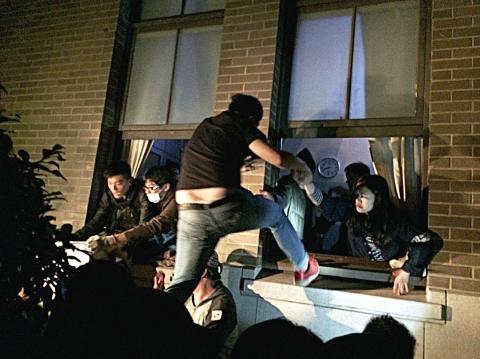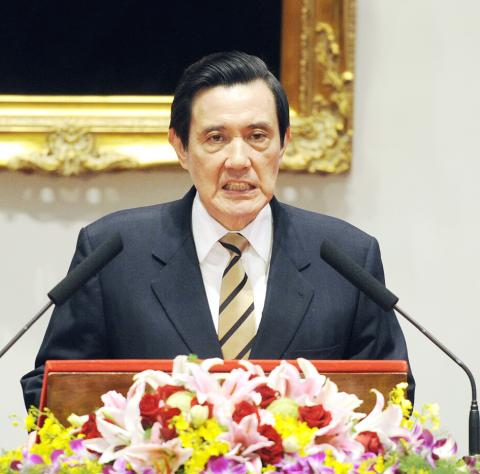Mounting frustration over what they see as the government’s lack of sincerity in addressing protesters’ demands over the cross-strait services trade pact led students to force their way through security barricades and razor wire into the Executive Yuan complex in Taipei last night to stage a sit-in.
At about 7:30pm, hundreds of students vaulted the barriers at the three main entrances of the Executive Yuan compound, clashing with police carrying shields and truncheons. As more students poured in, the police were outnumbered and in just half an hour, the complex was almost entirely occupied.
About one hour later, the students made it to the second floor of the Executive Yuan’s main building and, using a ladder, burst into Premier Jiang Yi-huah’s (江宜樺) office.

Photo: CNA
Several police officers and students were hurt in the ensuing melee as more police were deployed to contain the situation and ambulances called in to tend to the injured, which included some protesters who fainted and others injured by broken glass.
Meanwhile, more protesters gathered outside the building, shouting slogans such as: “Rejecting the cross-strait service trade agreement, defending democracy.”
They said they decided to occupy the Executive Yuan because President Ma Ying-jeou (馬英九) had apparently failed to understand the concerns they have repeatedly expressed over the past days.

Photo: George Tsorng, Taipei Times
At a press conference yesterday morning, Ma showed that he was completely ignoring the public’s voices, the activists said.
“We are here to tell Ma that he should listen to the public’s angry shouts and listen to their voices,” the students said, adding: “We will demonstrate citizens’ strength again and again.”
“Tonight we are in the Executive Yuan. Tomorrow we will go to other government agencies to voice our concerns,” they shouted.
Taiwanese should not be afraid of the government, the government should be afraid of them, the protesters added.
Protest leader Chen Wei-ting (陳為廷), a National Tsing Hua University student, said last night that the move to break into the Executive Yuan was not initiated by members of the Black Island Nation Youth Front — the group behind the Legislative Yuan occupation.
However, he said he fully respected civic groups’ decision to occupy the Executive Yuan compound, while fellow protest leader Lin Fei-fan (林飛帆), a National Taiwan University student and another key figure in the legislative occupation, stressed the principles of peace and non-violence.
At 11pm, Premier Jiang Yi-huah (江宜樺) ordered the National Police Agency to deploy more officers to the Executive Yuan to forcibly remove the protestors.
Executive Yuan spokesperson Sun Lih-chyun (孫立群) said that Jiang was distressed by the protesters’ moves, and had vowed to hold them responsible for what he called their illegal and violent actions.
According to the Executive Yuan, protestors burst into some offices on the second floor of the main building and damaged them.
Protesters also gained entry to Jiang’s office, but were soon forced out by police, the Executive Yuan said.
No damage to Jiang’s office has been reported.
Presidential Office spokesperson Lee Chia-fei (李佳霏) said that Ma discussed the situation with Jiang by telephone last night, and supported the premier’s decision to evict the protestors.
Security has been beefed up around the Presidential Office Building and the president’s residence, the Presidential Office said.
Earlier in the day, students and other activists occupying the legislative floor lashed out at Ma over his refusal to withdraw the service pact and push for legislation to monitor cross-strait agreements, vowing to continue their occupation of the Legislative Yuan and call for a nationwide strike.
“Regrettably, the president did not agree to hold a dialogue with us, as we wanted. Instead, he repeatedly iterated his propaganda, while ignoring the public’s voice and failing to come up with a concrete response to the expectations of Taiwanese and of the students,” Lin told a press conference at the legislative chamber held after Ma’s press conference.
“We are occupying the legislature because of the government’s unlawful actions [regarding the pact] and we hereby call on Ma not to twist the facts and reverse the cause and effect so he can blame the public for the situation,” Lin added.
Lin was referring to the announcement by Chinese Nationalist Party (KMT) Legislator Chang Ching-chung (張慶忠) on Monday last week that the trade agreement would skip the legislative committee phase of the review and be referred directly to the general assembly.
Lin said what Chang did was undemocratic, adding that “the government is setting the worst possible example for the public.”
He went on to say that the protesters would continue to demand that the government withdraw the trade pact and draft laws to oversee cross-strait agreements, before issuing a new demand that the government hold a nationwide conference to resolve the deadlock.
“Our occupation of the legislative chamber is meant to show how ridiculous the system is and to remind the government that, the citizens of a democratic country should take part in said country’s policymaking so they can help decide their nation’s future,” Lin said. “Taiwan must be a country for all Taiwanese.”
This story has been updated since it was first published.

CHAOS: Iranians took to the streets playing celebratory music after reports of Khamenei’s death on Saturday, while mourners also gathered in Tehran yesterday Iranian Supreme Leader Ayatollah Ali Khamenei was killed in a major attack on Iran launched by Israel and the US, throwing the future of the Islamic republic into doubt and raising the risk of regional instability. Iranian state television and the state-run IRNA news agency announced the 86-year-old’s death early yesterday. US President Donald Trump said it gave Iranians their “greatest chance” to “take back” their country. The announcements came after a joint US and Israeli aerial bombardment that targeted Iranian military and governmental sites. Trump said the “heavy and pinpoint bombing” would continue through the week or as long

TRUST: The KMT said it respected the US’ timing and considerations, and hoped it would continue to honor its commitments to helping Taiwan bolster its defenses and deterrence US President Donald Trump is delaying a multibillion-dollar arms sale to Taiwan to ensure his visit to Beijing is successful, a New York Times report said. The weapons sales package has stalled in the US Department of State, the report said, citing US officials it did not identify. The White House has told agencies not to push forward ahead of Trump’s meeting with Chinese President Xi Jinping (習近平), it said. The two last month held a phone call to discuss trade and geopolitical flashpoints ahead of the summit. Xi raised the Taiwan issue and urged the US to handle arms sales to

BIG SPENDERS: Foreign investors bought the most Taiwan equities since 2005, signaling confidence that an AI boom would continue to benefit chipmakers Taiwan Semiconductor Manufacturing Co’s (TSMC, 台積電) market capitalization swelled to US$2 trillion for the first time following a 4.25 percent rally in its American depositary receipts (ADR) overnight, putting the world’s biggest contract chipmaker sixth on the list of the world’s biggest companies by market capitalization, just behind Amazon.com Inc. The site CompaniesMarketcap.com ranked TSMC ahead of Saudi Aramco and Meta Platforms Inc. The Taiwanese company’s ADRs on Tuesday surged to US$385.75 on the New York Stock Exchange, as strong demand for artificial intelligence (AI) applications led to chip supply constraints and boost revenue growth to record-breaking levels. Each TSMC ADR represents

State-run CPC Corp, Taiwan (CPC, 台灣中油) yesterday said that it had confirmed on Saturday night with its liquefied natural gas (LNG) and crude oil suppliers that shipments are proceeding as scheduled and that domestic supplies remain unaffected. The CPC yesterday announced the gasoline and diesel prices will rise by NT$0.2 and NT$0.4 per liter, respectively, starting Monday, citing Middle East tensions and blizzards in the eastern United States. CPC also iterated it has been reducing the proportion of crude oil imports from the Middle East and diversifying its supply sources in the past few years in response to geopolitical risks, expanding